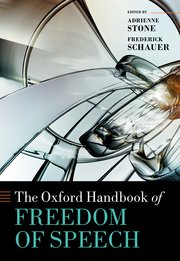| |
Pris: 1651 SEK exkl. moms  |  Freedom of speech is central to the liberal democratic tradition. It touches on every aspect of our social and political system and receives explicit and implicit protection in every modern democratic constitution. It is frequently referred to in public discourse and has inspired a wealth of legal and philosophical literature. The liberty to speak freely is often questioned; what is the relationship between this freedom and other rights and values, how far does this freedom extend, and how is it applied to contemporary challenges? Freedom of speech is central to the liberal democratic tradition. It touches on every aspect of our social and political system and receives explicit and implicit protection in every modern democratic constitution. It is frequently referred to in public discourse and has inspired a wealth of legal and philosophical literature. The liberty to speak freely is often questioned; what is the relationship between this freedom and other rights and values, how far does this freedom extend, and how is it applied to contemporary challenges?
The Oxford Handbook on Freedom of Speech seeks to answer these and other pressing questions. It provides a critical analysis of the foundations, rationales, and ideas that underpin freedom of speech as a political idea, and as a principle of positive constitutional law. In doing so, it examines freedom of speech in a variety of national and supra-national settings from an international perspective.
Compiled by a team of renowned experts in the field, this handbook features original essays by leading scholars and theorists exploring the history, legal framework and controversies surrounding this tennet of the democratic constitution.
This book:
- Explores the key rationales and principles that underpin our understanding of free speech
- Provides a comprehensive overview of freedom of speech as a legal principle in national and supra-national settings
- This volume is divided into three parts, with part one outlining the history of the idea of freedom of speech. Part two discusses freedom of speech as a legal prinicple and part three surveys the key controversies in its application
Table of Contents
Introduction
PART I: The Idea of Freedom of Speech: History, Rationales and Concepts
1. Mill on the Liberty of Thought and Discussion, Christopher McLeod
2. The Classic Arguments for Free Speech 1644-1927, Vincent Blasi
3. The Truth Justification for Freedom of Speech, Bill Marshall
4. Autonomy and Free Speech, Catriona McKenzie and Denise Meyerson
5. Freedom of Expression and Democracy, James Weinstein & Ashutosh Bhagwhat
6. Freedom of Speech and Human Dignity, Dieter Grimm
7. Economic Perspectives on Free Speech, Daniel Hemel
8. Freedom of Speech and Public Reason, Wojciech Sadurski
PART 2: Freedom of Speech as a Legal Principle
9. What is 'Speech'? The Question of Coverage, Fred Schauer
10. Proportionality and Limitations on Freedom of Speech, Gregoire Webber
11. Freedom of Speech in International law, Michael Hamilton
12. The Structure of a Free Speech Right, Stephen Gardbaum
13. Positive Free Speech: A Democratic Freedom, Andrew Kenyon
14. Speaking Back, Katharine Gelber
PART III: Controversies and Contexts
15. Defamation Law, Sullivan and the Shape of Free Speech, Andrew Kenyon
16. Privacy and Speech, Ioanna Tourkochoriti
17. Free Speech and Elections, Joo-Cheong Tham and K D Ewing
18. When is Speech that Causes Unlawful Conduct Protected by Freedom of Speech? The Case of the First Amendment., Geoffrey Stone
19. The Internet and Social Media, Greg Magarian
20. Parades, picketing and demonstrations, Timothy Zick
21. Insult of Public Officials, Christoph Bezemek
22. Freedom of Expression in the Workplace, Cynthia Estlund
23. Music and Art, Mark Tushnet
24. Free Speech and Commercial Advertising, Fred Schauer
25. Hate speech, Alon Harel
26. Pornography, Caroline West
27. Religious Speech, Gautam Bhatia
28. Glorifying censorship? Anti-terror law, speech and online regulation, Gavin Phillipson and Eliza Bechtold
29. Freedom of Media, Dieter Grimm
| | |
|